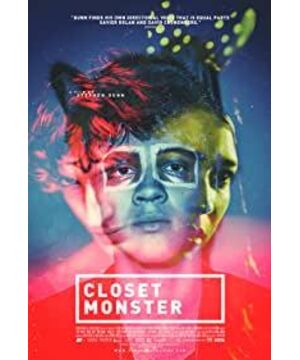Canadian emerging director Stephen. Stephen Dunn’s first feature film "Lover Monster" is not a horror film, but is named after a monster, because the film tells a gay/queer story; and he is not just a monster, but a victim. Monster trapped in the closet (closet). When Oscar (Connor Jessup) was six years old, he had witnessed his classmates being stabbed with iron bars by several evil boys. Although he was holding a wooden nail and wanted to stop him, his classmates were seriously injured because of hesitation. Oscar is very puzzled by this evil behavior. Father Peter (Aaron Abrams) just told him indifferently: "Because he is gay." Peter did not accuse Evil Shao's wrong behavior, but pointed the core of the problem to homosexuality: because he is gay, So deserve to be treated maliciously. This is Peter's unspoken heart. "That's why I asked you to cut your hair," Peter added. So Oscar cut off his mid-length hair by himself, and learned to do carpentry from his father. In the end, he finally grew up smoothly; he became a "normal" man.
Starting from the title, "Lover Monster" can be seen everywhere with obvious intentions, such as identifying homosexuality by looking at fingernails, or the masculine connection between "men" and short hair and carpentry. All these are based on stereotyped gender impressions, but they also reveal a fact: how easy it is to "play" a "man". However, because of this, the variability and floating nature of gender (gender) are more apparent. The uncertainty of this rejection of being defined is the greatest feature of queer. On the one hand, Oscar is repressed--everyone has a monster in his heart, so he can only suppress it and cannot remove it--the monster in his heart, on the other hand, keeps creating monsters. Oscar, who wants to be a professional special effects makeup artist, finds his friend Xiaojie (Sofia Banzhaf) as a model, sometimes sticking up demonic horns, sometimes dressing up as a sea monster, and taking photos for his portfolio. Oscar and Xiaojie are so comfortable and happy when they get along. In the eyes of onlookers like his father, their interaction may be like a young couple, but I feel that Oscar is just projecting his other self on Xiaojie. Just like Oscar's animal clone hamster Xiaobu.
Before Oscar's parents divorced, they once gave him a hamster as a birthday present. Oscar, who has a depressed childhood, often talks to hamsters, and the two are like playmates. But judging from the montage at the beginning of the movie, they are not so much friends as double selves. Hamsters often play the role of the animal's sensitive organs and point out Oscar's emotional dullness (or deliberately ignored). While working at home repair tools and materials shop, colleague Wade (Aliocha Schneider) forgot to bring his uniform, so he borrowed it from Oscar who was about to leave work. Oscar was embarrassed because he was afraid that his clothes might be stained with his own sweat, but Wade sniffed and said he didn't mind. Wade's unintentional behavior made Oscar feel up and down, and suddenly felt uncomfortable in his stomach, as if there was a butterfly flying in his stomach. After returning home, the hamster obviously felt the strangeness of Oscar. He said that his aura was different. "In love?" (Oscar’s human clone Xiaojie also noticed that the relationship between the two is unusual) Due to the shadow of childhood, Oscar desperately suppressed The same-sex emotional desire, once emotional, the bloody iron rod will pierce out of his stomach. But a hamster is not a human being, and it is not restricted by the mainstream society. It can express itself faithfully. In other words, Oscar is divided into two selves, Oscar/Hamster. They seem to have a clear boundary, but they continue to talk to each other to make the boundary dispensable. So Oscar walks on both ends, both human and beast (monster) ).
After Oscar got back his uniform, he couldn't help hiding in the toilet and sniffing the body odor while thinking about Wade masturbating. The fascination with smell in the film reminds me of "The Way He Looks" (The Way He Looks, 2014). The blind boy Leo once masturbated with the smell of another boy's clothes. Relying on the sense of smell is often classified as the primitive behavior of animals, but the echoing of the two gay movies does not imply that same-sex attraction comes from primitive natural desires? In other words, although Oscar has grown into a "normal" man under his father's education, his feelings and desires for the same sex have not been completely eliminated. The monster in his heart is just locked in the closet.
After his parents divorced for many years, his mother confessed to Oscar: "I hope I can stay for you, but that home suffocates me." As a father/husband, Peter has a loving side, but he also inherited the right of heterosexual paternity. Overbearing, he didn't want to return her mother's favorite woolen hat, saying, "After a couple divorced, everything must be divided equally, so the things in the cabinet belong to me." The male wardrobe set up by Peter , Not only suppressed homosexuality, but also tried to imprison women. But as the writer Ji Dawei said: "The state of the closet is a wandering boundary. No comrades are completely outside or in the closet." Mother has already escaped from the closet, and Oscar will naturally not stay in the closet forever. Oscar decided to open the closet and put on his mother's coat and hat. The restrained feminine (homosexual, female) forces gathered to counterattack, and Oscar kicked Peter into the closet. At this time, the closet monster changed from homosexual/queer to heterosexual patriarchy. However, the construction of the wardrobe is never unilateral. Oscar must also remove the iron bars in the body that symbolize the shadow of childhood, and complete the killing of the father (heterosexual patriarchy), and finally come out of the closet and complete the self. .
After stepping out of the closet, will Oscar be able to live happily ever after? In the show "Wonderful Flowers", Tsai Kangyong bluntly said that he would not encourage homosexuals to come out, because afterwards there will be all kinds of huge pressures to face, perhaps difficult or lonely. Oscar's story is full of violent bumps, but in any case, after such a bloody bump, it is a growth after all.
View more about Closet Monster reviews











